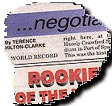

Olympics 2000 - no team sports for TnT
15 September 2000
By TERENCE HILTON CLARKE
WITH the Games of the 27th Olympiad set to begin in Sydney, this Friday, many Trinidadians will be eagerly anticipating the sight of this country’s 23 athletes marching behind the national flag, amidst the opening ceremony at the Olympic Stadium.
What we will be seeing: a group of swimming, taekwondo and track & field athletes moving proudly behind the Red, Black and White.
What we won’t be seeing behind the Red, Black and White: football, basketball and field hockey players.
Like all previous Olympic Games, Trinidad and Tobago will not be represented in any team sports thus maintaining a 52-year trend. Certainly, one would have liked to see Trinidad and Tobago teams taking on the world’s best, outside of the individual disciplines, especially in the sports that have become so established here, like football and field hockey. But, like all previous Olympic campaigns, this country’s teams simply could not cut it when it came to the basic requirement: making it through their respective qualifying competitions.
Earlier on this year, Trinidad and Tobago’s under-23 team was involved in this country’s tenth straight attempt to make it to the Olympic football tournament. Unlike the 1996 team that made it to the final round of the CONCACAF Olympic- qualifying competition, the 2000 generation only made it as far as the third round, where this country hosted one of three groups. That the Trinidad and Tobago team was in with a good chance of reaching the final round before losing 2-0 to the Canada in its last match was a major credit to some of the players, especially in light of the fact that the team was never properly treated. Coach Anton Corneal did not even have access to his top players until a few days before group play began.
Meanwhile, one notes that neither the men nor women’s field hockey teams even made it to their respective Olympic qualifying tournaments. The men, though, did have an extra chance: but the possibility of winning the gold medal at the Pan American Games in Winnipeg proved to be a very remote one in the end. Similarly, both of this country’s volleyball teams did not make it to either their respective world championships or their regional competitions. Which is more than could be said for basketball, with no teams being entered in the regional tournaments, due to financial constraints.
The problems in basketball are very evident. This past June, Trinidad and Tobago’s men’s team, a pre-tournament favourite, failed to advance past the first round of the CARICOM Championships in Barbados. The women’s team did manage to finish third, but not with the most convincing of displays. While basketball is very popular with the young, there seems to be a problem in capitalizing on this enthusiasm. There is no recognizable development programme, the local federation appears to be constantly hampered be a dearth of monetary resources and the lack of constant exposure to teams such as Puerto Rico and Cuba, which are 20 years ahead of Trinidad and Tobago in the game, are just some of the other limiting factors. In a hemisphere featuring some of the world’s best teams, Trinidad and Tobago field hockey is really up against it. An artificial surface (a basic feature of the modern game) was not installed in the country until 1996. Furthermore, field hockey lacks a development programme. Indeed, the sport has never branched out beyond a limited group of participants. The same applies to volleyball (which has only been taken seriously since the 1990s) and especially to beach volleyball and water polo, which had to be revived every four years until finally gaining some continuity. Baseball, softball and handball, the other Olympic team sports, are not even played in this country.
With the situation such as
it is, right now, it is probably already too late for 2004, and maybe
2008 as well. The lack of proper development and planning have already
put Trinidad and Tobago at a disadvantage to many of its competitors.
It is only when a proper structure is put in place that we will eventually
begin to see some changes. But, the more we delay doing something about
this problem, the more distant the chances of seeing Trinidad and Tobago
competing in team events at the Olympic Games.




